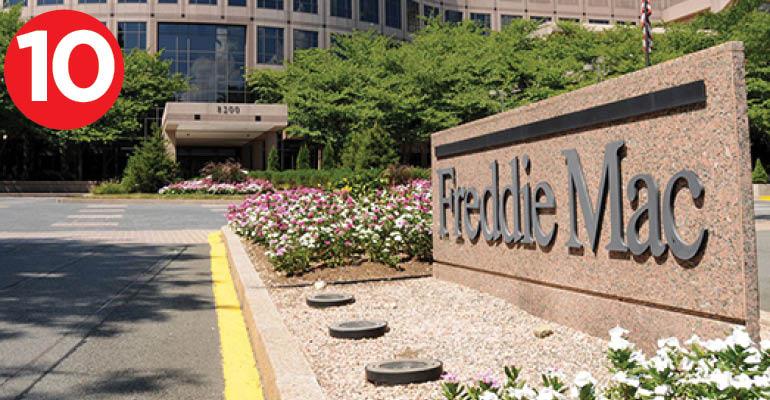- Old Navy Plans to Open 800 More Stores “Gap Inc.’s Old Navy brand plans to open hundreds of stores as it prepares to split from its parent company at a time when slower sales and online rivals are challenging many bricks-and-mortar chains. Clothing retailer Gap said earlier this year that it would separate its fast-growing budget brand from the rest of the business, creating two publicly traded companies. For several years, Old Navy has outperformed its sister brands Gap and Banana Republic with its lower price points and catchy marketing.” (Wall Street Journal, subscription required)
- Deutsche Bank Is First to Settle Fannie Mae, Freddie Mac Bond-Rigging Lawsuit “Deutsche Bank AG will pay $15 million to resolve claims it conspired to rig prices of bonds issued by Fannie Mae and Freddie Mac, becoming the first of 16 financial services companies to settle litigation by investors. The German bank also agreed to bolster internal oversight to detect anticompetitive conduct under the settlement, which requires court approval and was made public late Wednesday. Deutsche Bank did not admit wrongdoing.” (Reuters)
- Fannie, Freddie Regulator Sets New Caps on Lending for Multifamily Properties “The Federal Housing Finance Agency plans to limit the total number amount of multifamily loans the companies can purchase to $100 billion each, and it plans to eliminate exemptions from such caps for “green” loans—or lending to finance energy and water efficiency improvements at multifamily properties such as smart thermostats or low-flow toilets. The shift marks a reversal from policy set during the Obama administration, which imposed no limits on the amount of “green” multifamily loans the companies could purchase.” (Wall Street Journal, subscription required)
- Inbound, Outbound U.S. Commercial Capital Flows Significantly Dip in 2019 “Global real estate consultant CBRE is reporting this week that rising global economic uncertainty has dampened commercial real estate capital flows both into and out of the U.S. in the first half of 2019. With the longest global economic expansion on record, international investors face an increasingly complex calculus in identifying cost-effective opportunities for potential downturn protection, slowing cross-border capital flows. Inbound capital to the U.S. in H1 2019 was down by 48% from H1 2018 (about half of this decline was due to less M&A activity), and U.S. outflows were down by 18%.” (World Property Journal)
- How to Prepare for the Recession as a Real Estate Investor “As a real estate investor, you want to be prepared for when it does happen. If you think back to the last crash in 2008, the best deals were the years after that. If you had capital, you made a lot of money. It almost didn’t even matter what you bought because prices were so insanely low. What I’ve heard most from investors looking back at it is, ‘I wish I would’ve bought more properties.’” (Forbes)
- NYC’s Largest Student Housing Firm Makes a $101M Gamble on Owning Its Own Real Estate “A student housing company has purchased a Lower Manhattan building used as a Pace University dorm for about $101 million. The nonprofit company Educational Housing Services has purchased the 17-story property at 55 John Street from Tessler Developments, according to property records. It had been the sublandlord at the building prior to buying it outright, sources familiar with the deal said.’ (The Real Deal)
- Nursing Home Mogul Philip Esformes Sentenced to 20 Years for $1.3 Billion Medicaid Fraud “Esformes, who once controlled a network of more than two dozen health care facilities that stretched from Chicago to Miami, garnered $1.3 billion Medicaid revenues by bribing medical professionals who referred patients to his Florida facilities then paid off government regulators as vulnerable residents were injured by their peers, prosecutors said. He housed elderly patients alongside younger adults who suffered from mental illness and drug addiction — sometimes with fatal results.” (Chicago Tribune)
- They Can’t All Be Grand Central Market: Does L.A. Have Too Many Food Halls? “The freestanding collection of eateries at Santa Monica’s Third Street Promenade once was stocked with the likes of McDonald’s and Subway. And for years it was enough to attract the tourists and locals that frequent the popular outdoor shopping street. A few years ago, the two-story collection got a makeover and reopened as Gallery Food Hall with curated offerings including a tiny restaurant operated by a Michelin-starred chef, which requires reservations.” (Los Angeles Times)
- 5G REITs: Where Tech Meets Real Estate “Aside from the major cell phone providers, there are three big players in 5G technology, and they’re all real estate investment trusts (REITs). It’s a business that provides both growth, with the 5G rollout, and defense, as the rollout will continue rain or shine, in a good economy or a bad one. Right now, these three 5G technology REITs are an incredible opportunity for income investors.” (Forbes)
- U.S. Consumer Sentiment Rebounds Modestly in September “What happened: The current conditions index rose to 106.9 in September from 105.3 in the prior month. The index of expectations rose to 82.4 from 79.9 in August. But the rebound was not widespread. Concerns about the impact of tariffs were higher. “While a recession is not anticipated in the year ahead, neither is a resurgence in personal consumption,” said Richard Curtin, chief economist of the UMich survey.” (MarketWatch)
0 comments
Hide comments





